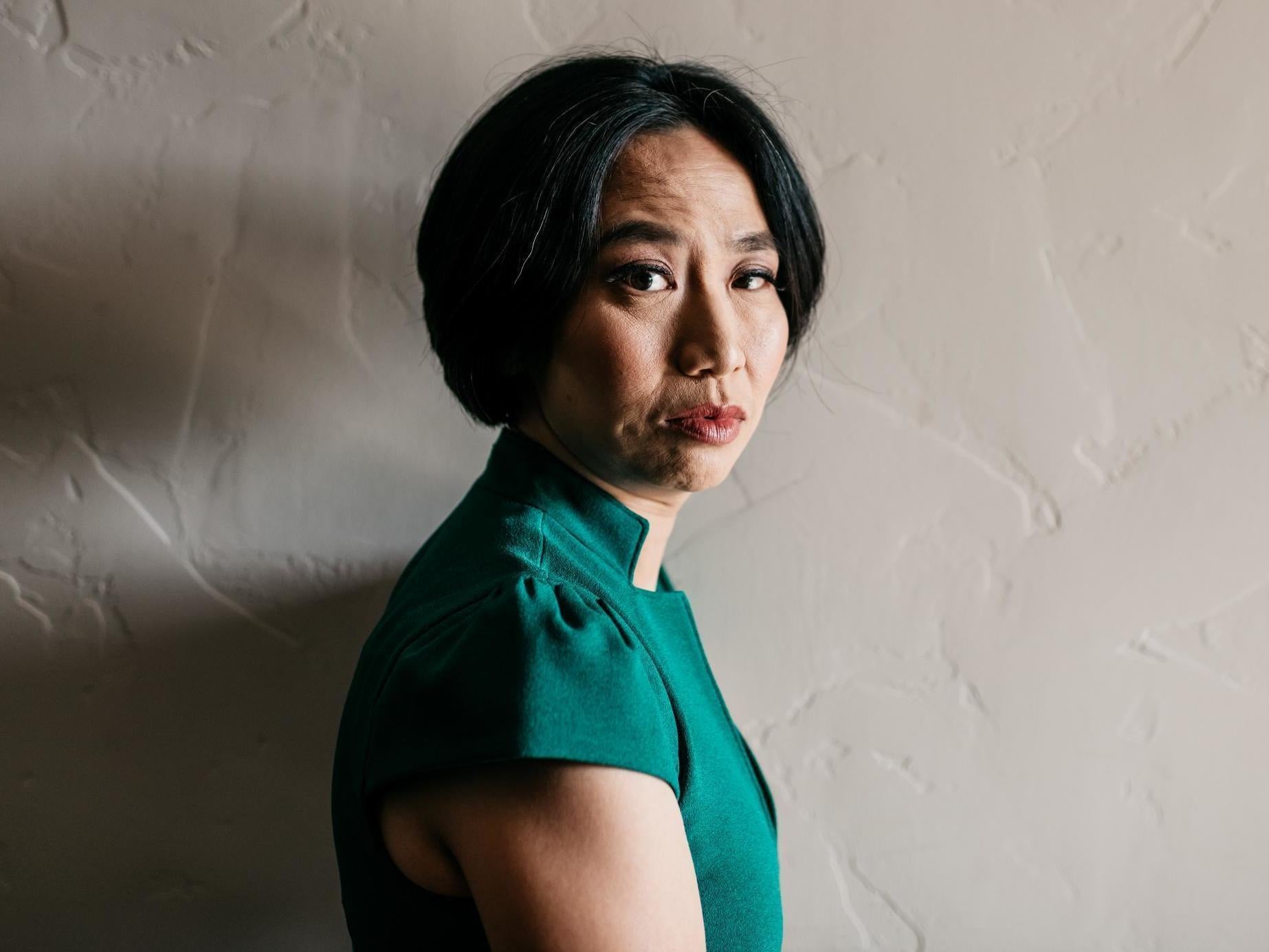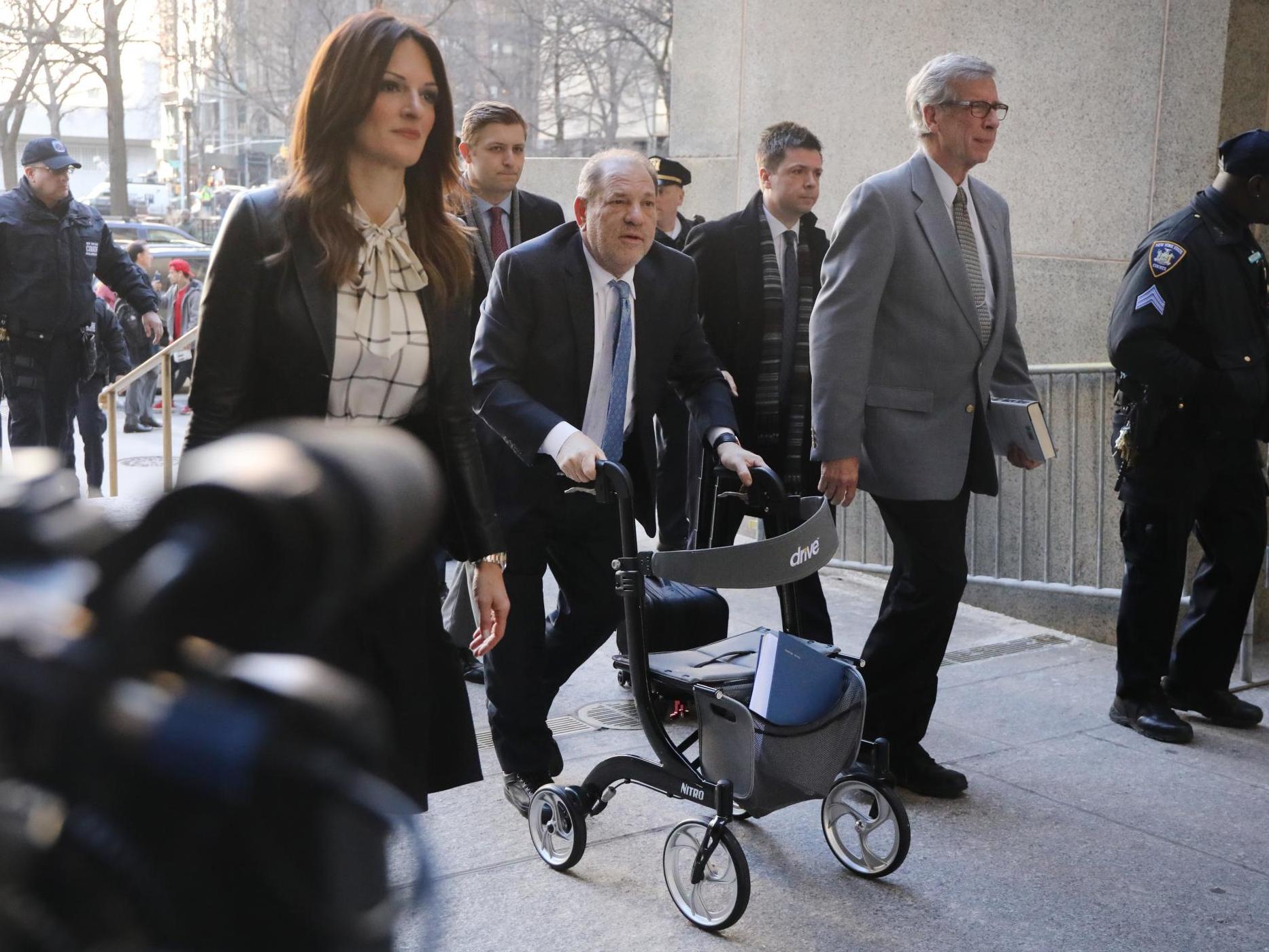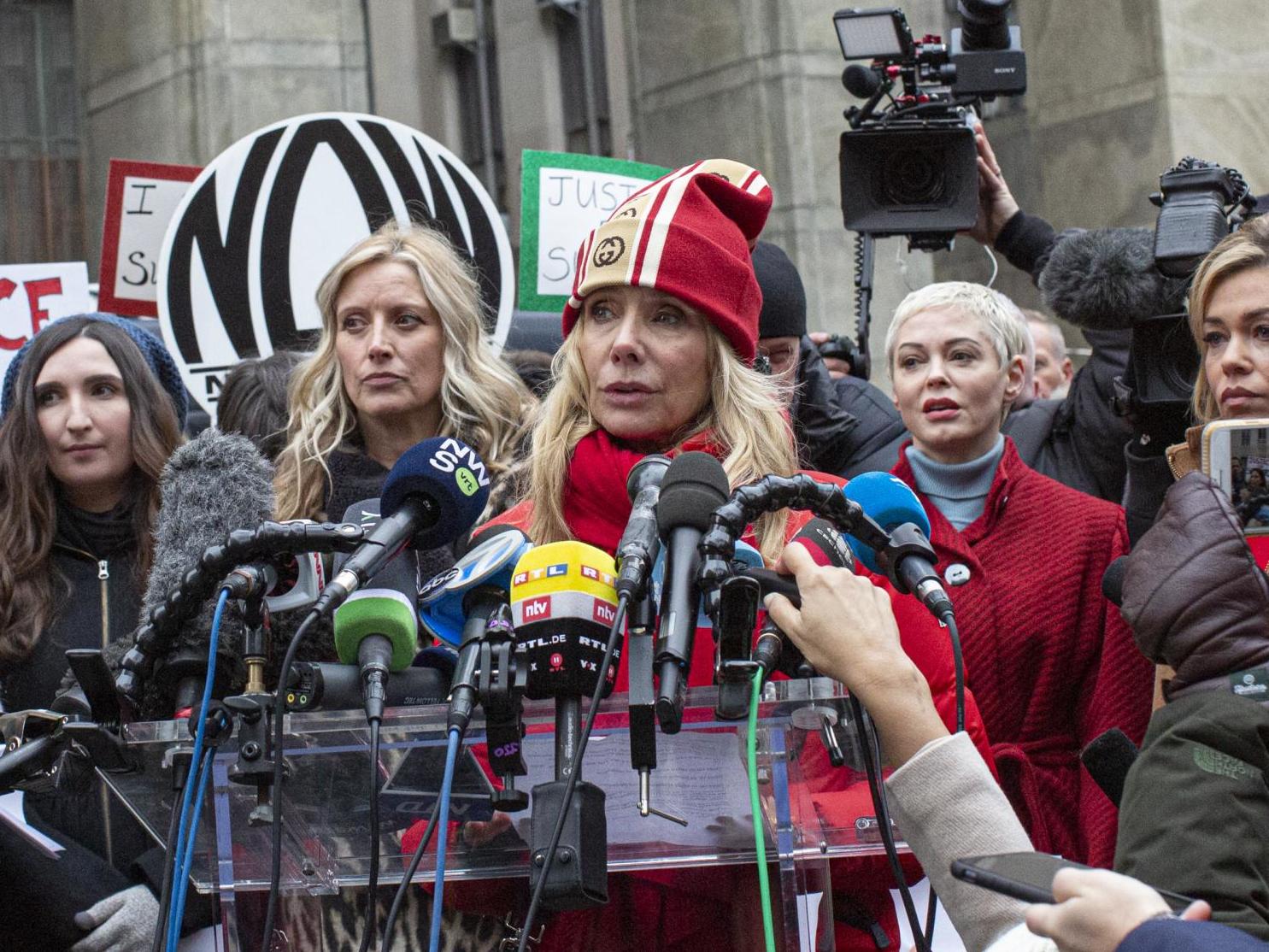Rowena Chiu: ‘The Harvey Weinstein survivors we know about are the tip of the iceberg’
The former assistant to the jailed producer talks to Olivia Petter about her attempted rape allegation against Harvey Weinstein, why his lawyers must be held to account, and the damaging myths we attach to rape survivors and perpetrators


Your support helps us to tell the story
From reproductive rights to climate change to Big Tech, The Independent is on the ground when the story is developing. Whether it's investigating the financials of Elon Musk's pro-Trump PAC or producing our latest documentary, 'The A Word', which shines a light on the American women fighting for reproductive rights, we know how important it is to parse out the facts from the messaging.
At such a critical moment in US history, we need reporters on the ground. Your donation allows us to keep sending journalists to speak to both sides of the story.
The Independent is trusted by Americans across the entire political spectrum. And unlike many other quality news outlets, we choose not to lock Americans out of our reporting and analysis with paywalls. We believe quality journalism should be available to everyone, paid for by those who can afford it.
Your support makes all the difference.Rowena Chiu does not want you to call her brave. “I’m grateful when people say it, but at the same time, I can’t help but worry it’s an indictment of sexual assault survivors who have chosen to stay silent,” she says over Zoom from her home in California. “Do they think, ‘Well, I’m not brave. I didn’t have the courage to speak out’? Tragically, those stories will never be told.”
It took Chiu 21 years to tell her own story. In September 2019, she publicly accused Harvey Weinstein of attempting to rape her in a hotel room in Venice, Italy, in 1998. Chiu, who grew up in the UK, was 24 at the time, and was working as his assistant when she reported Weinstein to her line manager, Zelda Perkins. The two attempted to take the allegation further but were instead pressured into signing a 30-page non-disclosure agreement that made it impossible for them to speak to anyone about the claim, including psychiatrists. In the years that followed, Chiu would attempt suicide, twice. Bound by fear of retribution, she never breathed a word of what happened to anyone, not even to her husband of 10 years, until he was doorstepped by The New York Times journalist Jodi Kantor. “My first thought was, ‘Oh s***’,” Chiu recalls. “But after that initial moment of panic, I told him not to worry, that story will never get published.”
Of course, that story did get published, igniting the global #MeToo movement that brought about Weinstein’s dramatic downfall and ultimate conviction. Chiu’s allegation was included in the article, but she was not named. “My biggest concern was my children,” she explains. “I was worried journalists would follow them to school. I also didn’t know which way public opinion was going to go.” It wasn’t until two years later that Chiu, now 45, would come forward with her allegation in an op-ed for The New York Times, prompting a vehement denial from Weinstein, who claims he and Chiu had a consensual six-month-long relationship. Chiu disputes this: “I didn’t even work for him for six months.”
We are speaking because Chiu features in a new US documentary, Harvey Weinstein, made by ITN for the Investigation Discovery network that includes interviews with several women who have made allegations against the disgraced producer, including the actor Rosanna Arquette. The documentary is one of the first to have been produced after Weinstein’s trial earlier this year, where he was found guilty of a criminal sex act in the first degree and rape in the third degree, but acquitted on three further charges. He has been sentenced to 23 years in prison.
“We were all bracing for a unanimous acquittal,” says Chiu, referring to herself and other survivors. “We started from this position of expecting nothing, so it was already a victory to see him in court.” Given the complexities of the testimonies from the two women in the trial against the producer – former Weinstein production assistant Miriam Haley and former actress Jessica Mann – Chiu felt validated by the 23-year sentence. Though it was disappointing to her that Weinstein was acquitted of the most serious charges against him: two counts of predatory sexual assault that carried a possible life sentence. And considering that more than 100 women have made allegations against Weinstein, many of whom cannot take their cases to trial due to the statute of limitations, Chiu maintains that a longer sentence would have been more appropriate. “I was in a taxi in New York recently and noticed a sign saying that assaulting a New York City taxi driver was a punishable offence of 23 years. And I’m thinking, ‘I could just get out of my taxi, not pay my fare, hit my driver in the face and I’d get the same sentence as Harvey Weinstein.’”
Chiu and I might be separated by screens, but her presence is palpable. Not least because she answers every question with the eloquence of an academic – she studied English at Oxford University – but because she manoeuvres the multiple interruptions we encounter from her four young children with insouciant authority. One needs help getting onto a Zoom class for school; another needs their nappy changed. And one just really wants some balloons. For much of our conversation, Chiu is breastfeeding. “This is all part of feeling empowered,” she says. “Yes, I’m a mum and the reality of my life in lockdown is that you can’t ignore these kids. So you have to keep going – that’s the reality for many women.”
Speaking to Chiu, you can clearly tell she is passionate about women’s rights. She talks at length about the way outspoken women are frequently undermined in society by being told they are “crazy” and is a passionate champion of every woman around her – except one. “Donna Rotunno is the wicked witch of the west,” she replies when I ask what she made of Weinstein’s controversial lawyer, who has represented 40 men accused of sex crimes. Ahead of the trial, Rotunno, who has eerily described herself as the “ultimate feminist”, famously said she had never been sexually assaulted because she “would never put [herself] in that position”.

But Rotunno is no caricature, and her views warrant scrutiny, namely because they form part of a systemic misunderstanding about sexual assault. “There’s a tendency to villainise the perpetrator,” says Chiu. “When we talk about rape, we hear of these evil powerful men that hold young beautiful women down to beds. It’s almost like a Disney story, where you have a hero and a villain.” This dichotomy is how sexual abuse and harassment becomes normalised, she explains. “Because we don’t talk about how someone like Harvey was very charming, or that everyone in Hollywood wanted to work for him. There’s no room for nuance. So these predators become larger than life, which means people ignore the more prevalent peril of ordinary men and women who are abusing people within their remits. It’s Joe in the corporate boardroom who puts his hand up a colleague’s skirt, or Martin who makes an inappropriate comment in a meeting. That is all part of predation and harassment. But I’m telling you, these perpetrators think, ‘I’m no Harvey Weinstein, I’m no Roger Ailes, I’m no Bill Cosby, and therefore the #MeToo movement doesn’t apply to me.’”
The details of Chiu’s allegations against Weinstein are harrowing. “After hours of fending off his chit-chat, flattery, requests for massages and a bath, ultimately I found myself pushed back against the bed,” she wrote in her New York Times op-ed. “I’d worn two pairs of tights for protection, and tried to appease him by taking one of them off and letting him massage me, but it hadn’t worked. He’d taken off the other pair and I was terrified my underwear would be next. Harvey moved in: ‘Please,’ he told me, ‘just one thrust, and it will all be over.’”
Late night meetings in hotel rooms may sound unusual to most, but they were fundamental to Chiu’s role. “That’s how our working hours were structured.” Prior to the alleged assault, did Weinstein say anything to make Chiu feel safe in that environment? “No. Nobody ever felt safe with him, but that’s not because we thought he was a serial rapist. Harvey was just a terrifying character to work for; if you punched a number into the phone too slowly, you’d be screamed at. There was always a high level of abuse, so you were already on high alert.”
Things turned predatory when women were alone with him. “There wasn’t any time he wasn’t trying to harass you.” Chiu was with Weinstein the evening prior to the alleged assault, she tells me. “He didn’t try to pressure me into having sex with him, but it wasn’t without sexual content. He was naked. He asked for oral sex. He asked for massages. It’s just that he didn’t attempt to penetrate me. Harvey normalised a certain level of sexual abuse to such an extent that you only realised it was wrong afterwards. Had he been a mildly mannered boss who suddenly threw you on the bed, you would run screaming. But because he’s already angry and he’s already yelled at you and you haven’t done anything about that, does the behaviour seem that bit weirder when he starts getting naked, or starts asking you to take your clothes off? It’s uncomfortable obviously, but you don’t feel in huge physical danger, you think you can handle it.”

The NDAs that Chiu and Perkins signed were iron-clad. Both women had to provide a list of the friends and family members whom they had spoken to about the claim; it was implied their addresses could be easily discovered by Weinstein’s team. If any of those people spoke out about the allegation, the former assistants would be legally bound to defend Weinstein. “If my mother told The Sun what had happened, I would have had to say that she made it up.” What Chiu finds most striking about the NDA, which she was not allowed to keep a copy of, is that it was signed in a room full of lawyers from Allen & Overy, who were acting on behalf of Weinstein and Miramax and are considered part of the “magic circle” of UK law firms with international prestige. “They covered up Harvey Weinstein’s crimes and were perfectly OK with it. Harvey admitted to them that he did not understand consent and operated without it.” Chiu’s voice is urgent and loud now – somehow her toddler is still sleeping soundly on her lap. “Harvey is not the only villain here. There were plenty of lawyers in that room who knew what was going on and said, ‘we’ll take our million dollars and shut these women up and that’s all perfectly fine’.”
Chiu is still in touch with Perkins (“she’s been doing some great activism in the UK”). In the wake of the allegation, both went on to pursue careers in other areas, with Chiu working in management consultancy and international development. But she still mourns the loss of a career in film. “The world will never know what [Weinstein’s survivors] could have done. He destroyed that.” Chiu may soon find herself back into the industry, though, given that she has been approached to write a memoir based on her experience with Weinstein that might one day be turned into a film. “Perhaps that’s the next chapter,” she says, excitedly. But if there’s one thing she wants to be remembered for, it’s advocating for other survivors. “The Harvey survivors we know about are the tip of the iceberg. I know several who aren’t public and probably never will be,” she says. “For a long time. I was one of them. So I often feel a responsibility to those women. It’s never our right as a society to put pressure on them to speak out. That decision is up to them.”
‘Harvey Weinstein’ airs at 9pm on Sunday 26 April exclusively on Quest Red and is available to stream on dplay
When approached by The Independent, Allen & Overy declined to comment.
Join our commenting forum
Join thought-provoking conversations, follow other Independent readers and see their replies
Comments